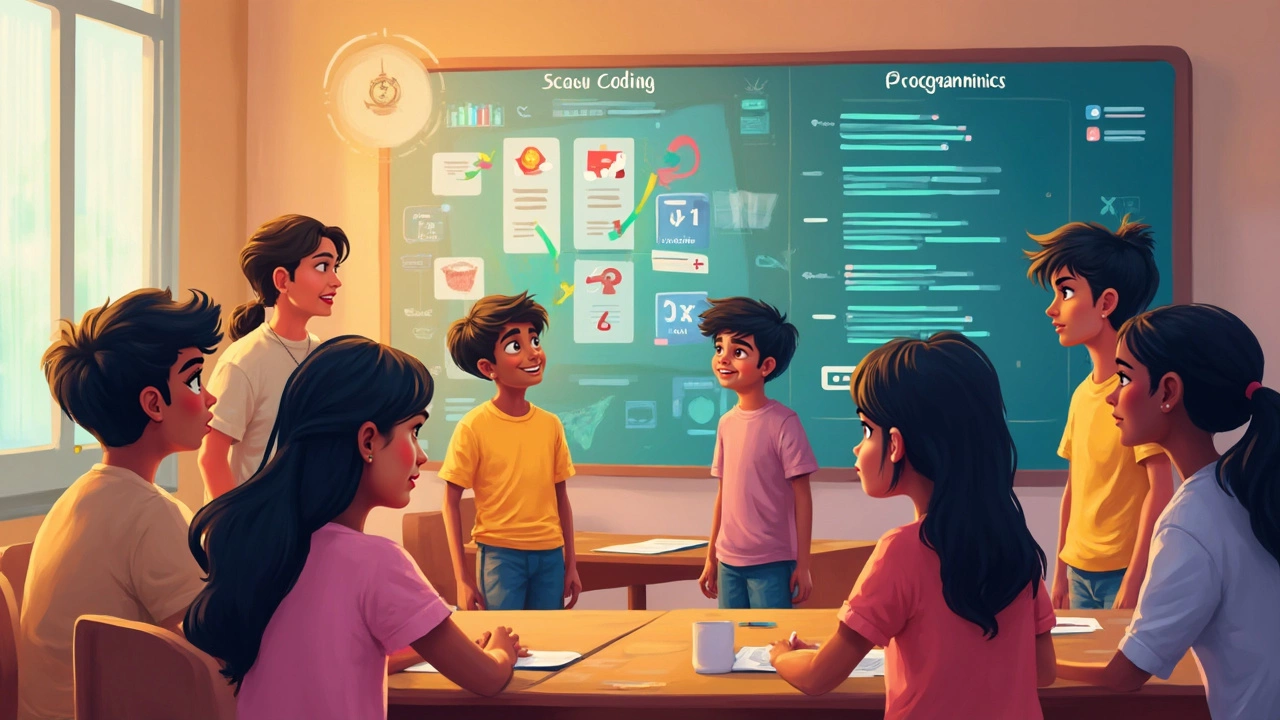The digital age continues to evolve at an astonishing pace, and the ability to code is now considered a fundamental skill, similar to knowing how to read or write. For beginners eager to dive into the world of programming, choosing where to start can often seem overwhelming.
Luckily, there are a variety of platforms and methods available today that cater to diverse learning styles and preferences. From self-paced online platforms like Codecademy and freeCodeCamp to immersive bootcamps that promise career-ready proficiency, the options are plentiful.
Additionally, community colleges offer structured learning environments that can often provide both foundational knowledge and networking opportunities. As we navigate 2025, understanding the landscape of educational resources for coding is crucial for making informed decisions about your programming education journey.
- Why Learn to Code in 2025?
- Top Online Platforms for Beginners
- Bootcamps: Intensive Learning
- Local Community College Programs
Why Learn to Code in 2025?
There's no doubt that in 2025, coding is more than just a skill—it's a crucial key to unlocking countless opportunities across varied fields. The ability to write code opens a window to professions that are becoming the backbone of today's digital world. As every industry continues to integrate more technology, individuals with the capability to build, understand, and troubleshoot software systems are in incredibly high demand.
Learning to code offers flexibility in career choices, whether you aspire to be a software developer or want to apply programming knowledge to enhance another profession. For instance, digital marketing now relies heavily on data analytics, which is aided by understanding coding scripts. According to a report by the Bureau of Labor Statistics, software development jobs are expected to grow by 22% from 2021 to 2031, much faster than the average for all occupations. This growth is fueled by the continuous demand for innovative apps and services, solidifying that knowing how to program is akin to holding a carpenter's favorite tool—a tool necessary for constructing the framework of future tech and business.
Besides career benefits, coding fosters problem-solving skills and logical thinking, which are valuable in everyday scenarios. Imagine you're managing a budget for a project; breaking the larger task into smaller, manageable pieces is akin to how programmers tackle challenges by writing functions and breaking down problems. These cognitive abilities often extend beyond work, aiding personal decisions and improving daily life efficiency. In a world that's increasingly driven by logical systems, having these skills is unquestionably advantageous.
The scope of learning coding now extends beyond traditional routes. Many are utilizing their coding expertise to bring innovations to life, such as creating apps that address real-world issues or developing platforms that shape how we communicate. In 2025, it's shown to be pivotal in fields just scratching the surface—like artificial intelligence and biotech—a reminder that the vast digital frontier is a canvas ready for creative minds who delve into programming.
For those who are still unsure, Jeff Bezos once said, "If you decide that you’re going to do only the things you know are going to work, you’re going to leave a lot of opportunity on the table." Picking up programming gives you the power to transform ideas into reality, exploring uncharted territories of what could be.
Moreover, coding contributes substantially to job security. As automation swiftly replaces repetitive tasks, those equipped with programming skills find themselves in a position to either contribute to creating such technologies or pivot within industries as voids emerge. This adaptability ensures sustainability in one's professional journey, regardless of economic shifts.
Embracing coding isn't just about jumping on a tech trend; it's about positioning yourself at the forefront of dynamic change. Whether you wish to upskill within your current role or launch into a brand-new career, learning to code in 2025 is an investment in a future intricately linked to the pulse of technology and progress.

Top Online Platforms for Beginners
Dipping your toes into the vast ocean of coding can be an exhilarating yet daunting experience. Thankfully, in 2025, a wealth of online platforms is at your fingertips, each catering to newbies looking to learn coding. Many platforms not only offer courses that break down complex programming concepts into digestible snippets but also provide interactive environments where learners can practice coding hands-on. This approach not only cements understanding but also builds confidence. Among these, Codecademy remains a popular choice, offering a structured learning path that transitions seamlessly from foundational theories to more advanced topics.
Another contender in this arena is freeCodeCamp, renowned for its community-driven learning approach. It's a treasure trove for those seeking education without a hefty price tag. Their curriculum is exhaustively detailed, giving learners the chance to work on real-world projects that can be added to their portfolios.
"Self-taught developers are the fuel of the digital age," says Quincy Larson, founder of freeCodeCamp. "Our goal is to make education accessible, fostering a global community of coders."These platforms not only focus on developing technical skills but also emphasize soft skills, which are critical in collaborative tech environments.
For learners who prefer a bit more interaction and accountability, platforms like Udemy and Coursera offer courses led by instructors. These courses often come with peer reviews and assignment deadlines that mimic the structure of a traditional classroom setting. They cover a wide array of programming languages, so learners can choose to start with something simple like HTML and CSS before progressing to more complex languages such as JavaScript or Python. The inclusion of certifications upon course completion can be a compelling draw for those looking to bolster their resumes.
Additionally, opportunities to attend live coding workshops or Q&A sessions with instructors help bridge the gap that online learning can sometimes face. These sessions foster a better understanding of the material and offer a glimpse into real-life application of coding skills. Notably, these platforms also foster a vibrant community where learners can share achievements, ask for help, or collaborate on coding challenges.
In a world where technological proficiency is increasingly valuable, selecting the right platform can be pivotal in your coding education. It's worth investing time in exploring these options, reading reviews, and even trying out free modules or trials before committing fully. With the right platform, you'll not only embark on a journey towards technical mastery but also begin to see the world through the creative lens of a programmer.

Bootcamps: Intensive Learning
For those who thrive in fast-paced environments and are eager to plunge into the realm of coding, bootcamps offer a unique and effective pathway. These programs are designed to be high-intensity, short-term immersions that aim to take beginners from zero to hero in a matter of weeks to months. Unlike traditional educational routes, coding bootcamps focus on practical skills and real-world applications, preparing learners to step directly into tech roles. Most bootcamps last between 12 to 24 weeks, with schedules ranging from full-time to part-time, allowing for flexibility alongside other commitments.
The popularity of coding bootcamps has soared as they promise not just education, but a transformation. Many boast impressive employment rates post-graduation, with some programs even offering income-share agreements where students pay tuition only after securing a job in the tech industry. In 2025, notable bootcamps such as General Assembly, Flatiron School, and Le Wagon are leading the charge, offering curriculums that are continuously updated to reflect current industry trends and technologies. A key advantage of these intensive coding classes is the hands-on experience that students gain, often working on projects that can be showcased in a portfolio to potential employers.
One reason bootcamps stand out is their focus on community and networking, which can greatly enhance a beginner's learning experience. Students often have the opportunity to connect with instructors who are industry veterans and peers who share similar goals. This network can be invaluable when seeking job opportunities or collaborations in the future. Additionally, many bootcamps offer career services such as resume workshops, interview coaching, and networking events. This is invaluable for beginners who need extra support navigating their entry into the tech job market. According to a study by Course Report, in 2023, the average salary increase for bootcamp graduates in the United States was around 51%, showcasing the significant impact these programs can have on one’s career trajectory.
"Coding bootcamps can absolutely be worth it if you approach them with the right mindset and expectations," says John Sonmez, author of 'The Complete Software Developer's Career Guide'. He emphasizes that success in a bootcamp depends largely on the effort put in by the student—it's a leap that rewards those willing to dedicate time and energy.
As we move further into 2025, the question remains: Is this intense way of learning suitable for every beginner? While bootcamps provide the knowledge and tools needed to embark on a coding career, they are best suited for those who are ready to commit fully. The monetary investment, while often significant, can yield substantial returns with the right dedication and passion. For those eager to immerse themselves quickly and effectively into programming education, coding bootcamps remain a compelling option, offering both skills and connections vital for growth in the tech world.

Local Community College Programs
For many looking to learn coding, local community college programs offer a fantastic opportunity to gain comprehensive knowledge in a structured environment. These institutions have been the backbone of vocational training and education for decades, and as the demand for tech skills continues to grow, many community colleges have risen to the occasion by offering robust programming courses. Often designed to fit into a traditional academic calendar, these programs allow students to immerse themselves deeply into the world of coding over a series of semesters.
These courses cover a breadth of important topics such as basic programming languages like Python, Java, and C++, as well as fundamental concepts in algorithms and data structures. In addition to technical skills, students often get a chance to work on soft skills such as team collaboration and problem-solving, which are indispensable in the tech industry. Many community colleges also have partnerships with local businesses, offering students a foot in the door for internships and job placements. This practical element is particularly useful as learning to code in real-world scenarios often extends beyond what textbooks can provide.
One critical advantage of choosing community college coding classes is the cost-effectiveness. Compared to private coding bootcamps or degree programs at four-year universities, community colleges often offer these courses at a fraction of the cost, making them accessible to a broader audience. This affordability does not come at the expense of quality, as many community college instructors have extensive industry experience and bring this expertise directly to their teaching methodology. It's worth mentioning a statement from a professor at a renowned community college:
"Our goal is to empower students with the skills needed to succeed in a rapidly changing technological landscape, offering them both theoretical knowledge and hands-on experience."
Moreover, these programs cater to both full-time students and working professionals looking to enhance or pivot their careers. Evening and weekend classes are common, providing flexibility for those balancing work and study. Beyond the coursework, community colleges frequently host tech events, hackathons, and meetups, allowing students to network with industry professionals and peers. Such events can be invaluable, providing insights into the latest trends and tools in tech.
To help potential students find the right program, many community colleges publish success metrics and alumni stories. This transparency helps to set realistic expectations regarding the skills acquired and the potential job opportunities post-completion. These success stories often serve as motivating testimonials for those considering enrolling. In 2023, a survey highlighted that 85% of coding students from community colleges were either employed in tech roles or opted for further studies within six months of graduation. This speaks volumes about the quality and impact of these programs.




